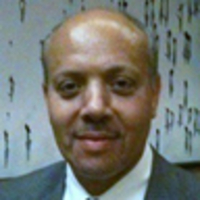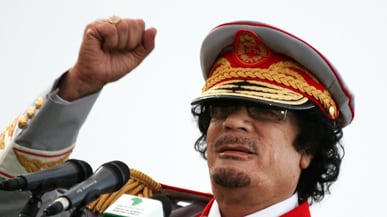The Libyan dictator's bipolar antics on ABC Monday are consistent with a man who tried to execute me, held my young daughter hostage—and recently gave me a hug, Fadel Lamen writes. Plus, full coverage of the Libyan uprising and Babak Dehghanpisheh on the Libyan journalists joining the revolution.
When I met Muammar Gaddafi in September 2009, he cut off the aide who was introducing us. "I know him, I know him." Then the dictator, looking tired and frail following his first-ever flight to New York, gave me a hug: "I hope your family is well."

I offer this anecdote to anyone looking for insight into Gaddafi, on the heels of his deranged rant Monday to ABC's Christiane Amanpour about how there were no demonstrations against him in Tripoli and how "all my people love me." I've been dealing with Gaddafi for my entire life, and my family's relationship with him explains a lot about how he's managed to cling to power and why it's proving so hard to dislodge him.
It's important to understand that there is no central core to Gaddafi other than a perpetual power. The regime has never had a long-term strategy. The policies seem bipolar, because the only philosophy is survival, using three tools: fear, manipulation and money.
Thus, unlike Saddam, who thumbed his nose at foreign powers as vehemently as he gassed his rebellious countrymen, Gaddafi hunkers down when facing external threats to him or his regime, giving him a global reputation as an eccentric rather than a butcher. He exudes a certain disdain for Libya, so he's certainly not going to risk his neck for national glory. And he's only too happy to buy off his neighbors. African leaders used to send envoys to Gaddafi with a personal letter and small piece of paper passed separately with their own bank account numbers, a member of the his inner circle, called "the men of the tent," once told me.
But inside Libya, as the world has now seen, he resorts to the ultimate levels of brutality and repression. And he does this with the same type of practical caginess. Take the hug, and the friendly questions about my family. My grandfather, who shares my name, was one of the main figures in the struggle against the Italian occupation, a top military commander and advisor to Omar Mukhtar. Accordingly, since my family hails from Eastern Libya, when Qaddafi took power in 1969, he named one of his loyal military brigades in Benghazi after him, "Al-Fadhil Bu Omar."
I was declared an enemy of the state—and sentenced to death.
Such public respect, however, is a show, conveniently thrown out whenever he felt the least bit threatened. He did not hesitate to sentence my brother, a journalist and a poet, and his friends, to life in prison because of his criticism of the regime in the late 1970s. The bogus charge: he was the head of a communist cell. Gaddafi always confided to his friends that he felt sorry for their fate—he of course knew they were innocent—yet this did not keep him from leaving them in jail for over a decade.
And despite those kisses, it also did not keep him from trying to do worse to me. While I attended Tripoli University (al-Fateh) in 1980, Gaddafi ordered the college militarized. Along with other student leaders, I rejected this order. In response, he sent in his revolutionary guards militia.
Numerous students were hanged in the university's main square. The security forces also attacked a local mosque, which they believed was encouraging the disobedience. Several worshippers were arrested, and tortured to death; the imam, meanwhile, was taken to a wooden area outside Tripoli, shot, and buried.
Then, they came looking for me. I had happened to be away from my home, visiting a friend, during the roundup. Some of my friends were taken hostage until I came back. But using my father's name, I managed to escape to America. As Gaddafi continued the executions, I was declared an enemy of the state—and sentenced to death. I would never see my parents again.
I never took it personally. After all, Gaddafi killed his own trusted cousin Hassan Eshakal after suspecting him of disloyalty. In some ways, Gaddafi did me a favor. I wound up in America. I started a family, and became a journalist in a country with no press restrictions. I became a columnist for Asharq Al-Awsat, and a consultant to the U.S. State Department.
And none of this was lost of Gaddafi. Three decades after he tried to kill me, his lieutenants and sons tried to woo me. More than a threat to their survival, now that they were trying to get into the good graces of America, I was now also viewed as a potential bridge. When my brother once complained to Gaddafi about corruption, he replied: "I know these guys are corrupt, and not very nice, but I need them." So would I fall into line? Come back and visit Libya, they implored. Come sit down with Gaddafi.
I agreed to the trip back home—I wanted to see my relatives. But I also insisted on meeting Gaddafi on neutral turf. Having observed this guy for 40 years, I knew that engaging him in his den—even with my blue American passport—was too risky.
Fate then offered the opportunity. Gaddafi was making his first trip to the U.S., and the U.N.—his reward for giving up his weapons of mass destruction program. As a showman who loves the theatrics, addressing the UN general assembly is the ultimate stage. "We have finally arrived," he told me, smiling. "This is a new era."
We exchanged small talk, and then I was turned over to his aides, including his brutal son, al-Muatasim. To this group, I encouraged them to use this "new era" to transition to democracy.
That was the state of play when I returned to Libya the following month. Come and see Gaddafi, his people again pleaded. I demurred, instead driving across the country from west to east, seeing my relatives and talking to my people for the first time in 29 years.
But by not seeing Gaddafi, I had clearly set off an alarm. I was not going to be one of the corrupt guys he "needs." As I sat at the airport, waiting to leave, the Libyan Internal Security Services pulled me aside. I was still an official "enemy of the state," they pointed out. Someone condemned to death. For four hours, they detained me. My British Airways flight waited on the tarmac, as the other passengers awaited my fate. Finally, after various agencies conferred, I was cleared. "We were asked to let him enter without problems," one of the agents told me, "but nothing was mentioned about letting him leave."
Around that time, something more disturbing happened: My 10-year-old daughter traveled with her mother to Tripoli for a family wedding. She was greeted by security forces at the airport, who took her passport away from her. They told her mother she was free to leave, but since I was wanted man, she would remain hostage. "We just want her father," her mother was told.
For two weeks, her mother tried to get her out. Finally, I put heat on the State Department and the Libyan embassy, informing them that an American citizen was being held hostage. The demands went all the way to Gaddafi's son, Saif, who finally approved her release.
I never took any of this personally. With Gaddafi, you can't. But in the same regard, I always hope that he could change. Three weeks ago, as Egypt was in the middle of its revolt, I sent Gaddafi a five-page letter. It laid out the choice so obvious from over here: pave the way for free and fair elections, and a new constitution, and leave office as a hero. Or else face the violent realities that had gripped Tunisia and Egypt. A mutual friend confirmed that he had personally received the letter. I also emailed it to his son Saif, whose address I have. But the only response has been via fear, manipulation and money.
Fadel Lamen is a journalist, writer, and Middle East/North Africa expert and cultural adviser based in Washington, D.C. He is a frequent traveler to the Middle East and has been published in Arabic and English newspapers and magazines. He also has been interviewed by major media outlets in English and Arabic on issues related to the Middle East, Islam, and American foreign policy.





